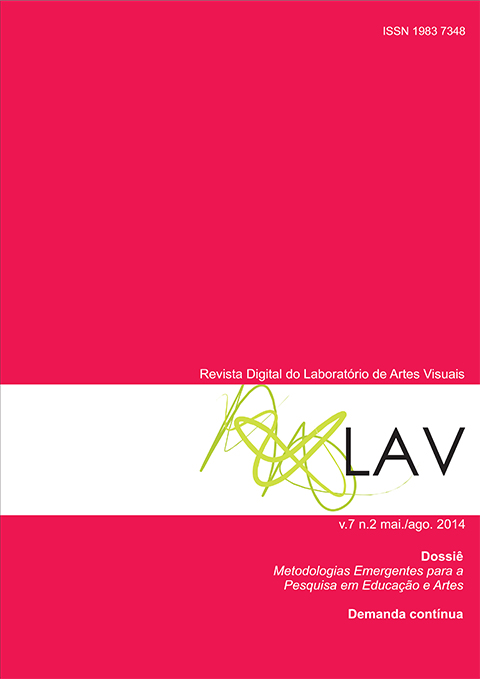Share experiences among women, artist and teachers through virtual tools
DOI:
https://doi.org/10.5902/1983734813516Keywords:
Listening, Shared experience, Online research, WomenAbstract
In this paper I share the experience of investigating from an online context. This virtual tool allowed me to share, discuss and understand the experiences of a group of women, art teachers in Chile, becoming a place of encounter and reflection on their professional development. To explain the research process I will focus on two important aspects. First I will explain how this platform emerged and how was performed. On the other hand I will perform a brief review of the literature of online methods, to understand how it articulated, from this virtual methodology, the notions of space, time, and ethics in this first approach to their experiences. Finally I will tell my role and experience as a researcher insider-outsider and the relationships that were built in and through the platform.Downloads
References
BEST, S., KRUEGER, B. (2008) Internet Survey Design. En Fielding, N., Lee, R., Blank G. The SAGE Handbook of Online Research Method. (pp. 217-236) London: SAGE.
BOELLSTORFF, T., NARDI,B., PEARCE, C., TAYLOR, T. L. (2012) Ethnography and Virtual Worlds: A Handbook of Method. New Jersey: Princeton University Press
BOWKER, N., TUFFIN, K. (2004) Using the Online Medium for Discursive Research About People With Disabilities. Social Science Computer Review, 22(2), 228-241. SP
DWYER, S., BUCKLE, J. (2009) The Space Between: On Being an Insider-Outsider in Qualitative Research. International Journal of Qualitative Methods, 8(1), 54-63.
EYNON, R., FRY J., SCHROEDER, R. (2008) The Ethics of Internet Research. En Fielding, N., Lee, R., Blank G. The SAGE Handbook of Online Research Method (pp. 23-41) London: SAGE.
FALZON, M.A. (2009). Introduction. In M. Faixon (Ed.) Multi-sited Ethnography: Theory, Praxis and Locality in Contemporary Research (pp. 1-24). Cornwall: Ashgate
FIELDING, N., LEE, R., BLANK, G. (2008) The Internet as a Research Medium: An Editorial Introduction to The Sage Handbook of Online Methdos. The SAGE Handbook of Online Research Method (pp. 3- 20) London: SAGE.
GUBBER, R. (2004) El salvaje metropolitan. Reconstrucción del conocimiento social en el trabajo de campo. Buenos Aires: Paidós
HEWSON, C., LAURENT, D. (2008) Research Design and Tools for Internet Research. En Fielding, N., Lee, R., Blank G. The SAGE Handbook of Online Research Method ( pp. 58-78) London: SAGE.
HINE, C. (2001) Virtual Etnography. London: SAGE
JOINSON, A., MCKENNA, K., POSTMES, T., REIPS, U.D. (2007) The Oxford Handbook of Internet Psychology. Oxford: University Press.
JOINSON A., PAINE, C. (2007) Self-disclosure, privacy and the Internet. En Joinson, A., McKenna, K., Postmes, T., Reips, U.D. The Oxford Handbook of Internet Psychology (pp. 237-252) Oxford: University Press.
JONES, S. (1995) Cybersociety. Computer-Mediated Communication and Comunity. London: SAGE.
KUSOW, A. (2003) Beyond Indigenous Authenticity: Reflections on the Insider/Outsider Debate in Immigration Research. Symbolic Interaction, 26(4), 591–599.
MADGE C., O’CONNOR, H. (2002) On-line with e-mums: exploring the Internet as a medium for research. Royal Geographical Society, 34(1), 92-102
MANN C., STEWART, F. (2000) Internet Communication and Qualitative Research: A Handbook for Researching Online. SAGE: London.
MARCUS G. (1995) Ethnography in/of the World System: The Emergence of Multi-Sited Ethnography. Annual Review ofAnthropology, 24, 95-117.
MASSEY, D. (2005) For Space. SAGE: California
MEHO, L. (2006) E-Mail Interviewing in Qualitative Research: A Methodological Discussion. Journal of the American Society for Information Science and Technology, 57(10), 1284–1295.
MURRAY C D, SIXSMITH J. (2008) Email: a qualitative research medium for interviewing? International Journal of Social Research Methodology: Theory and Practice, 1(2), 103-121.
PAECHTER, C. (2012) insider/outsider position in a retrospective ethnographic study Researching sensitive issues online: implications of a hybrid. Qualitative Research, 13(1), 71–86.
TAYLOR, J. (2011) The intimate insider: negotiating the ethics of friendship when doing insider research. Qualitative Research, 11(1), 3–22.
THE PERSONAL NARRATIVE GROUP (1989) Interpreting Women´s Lives. Feminist Theory and
Personal Narratives. Indiana: Indiana University Press.






